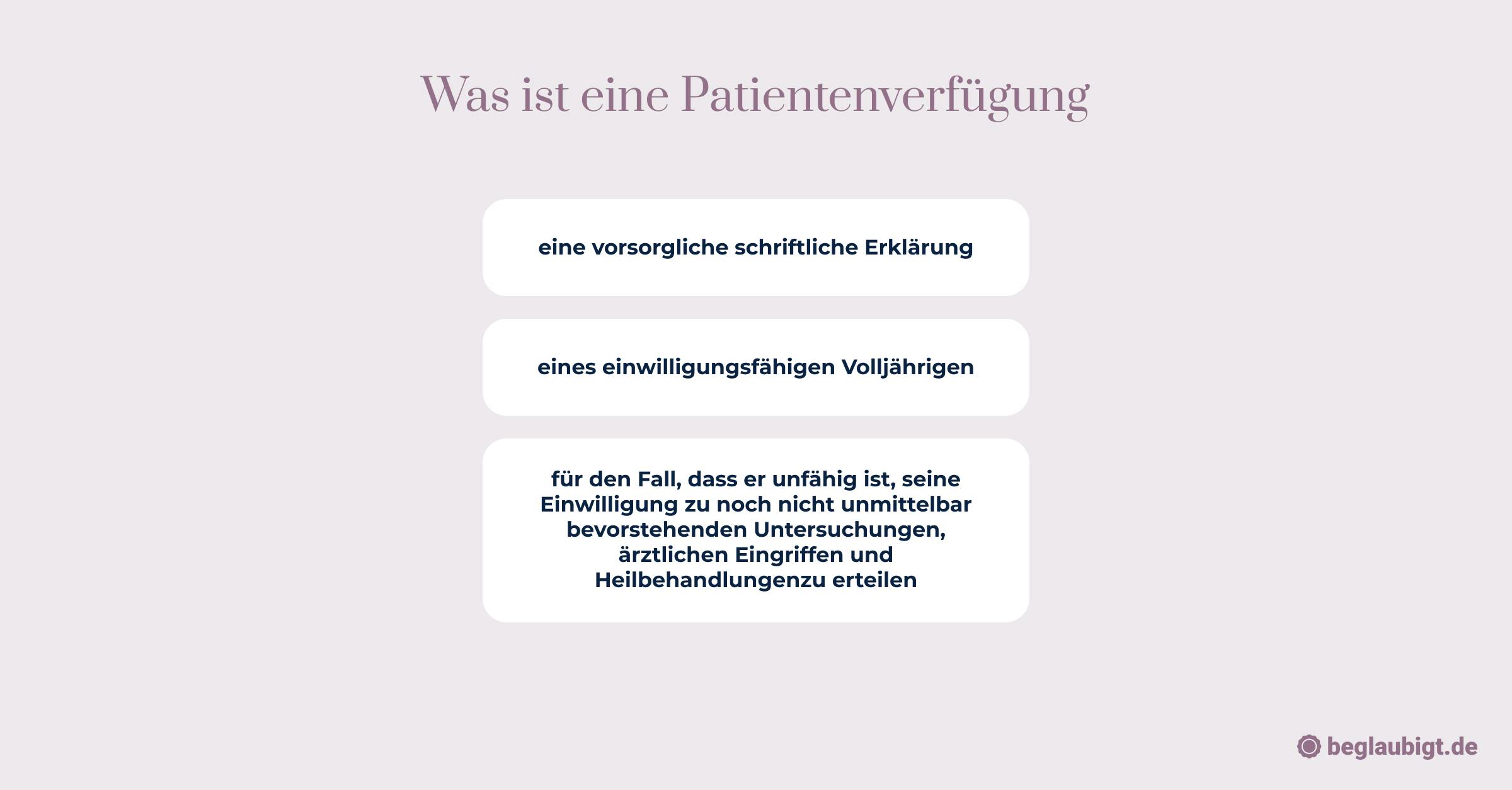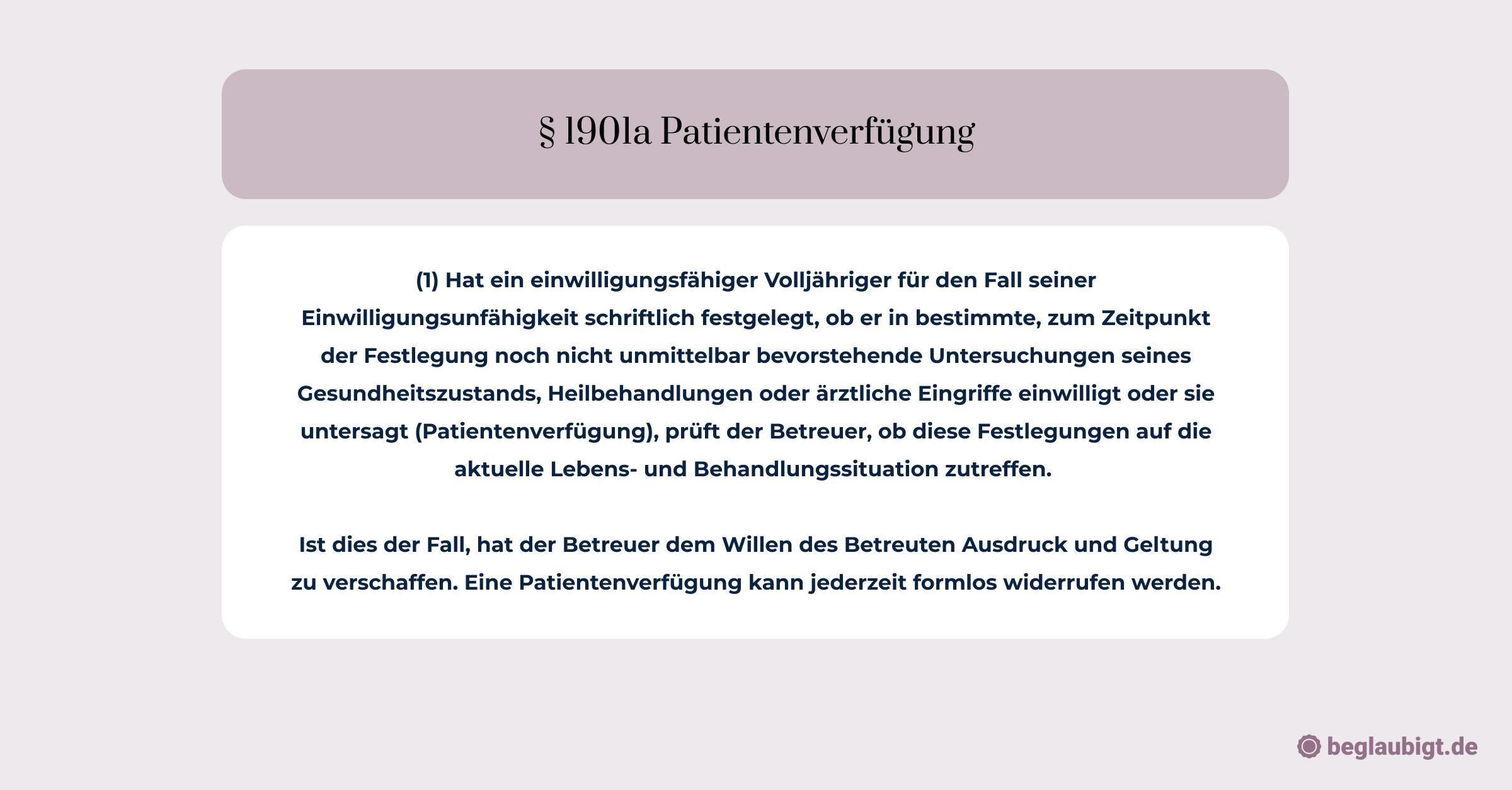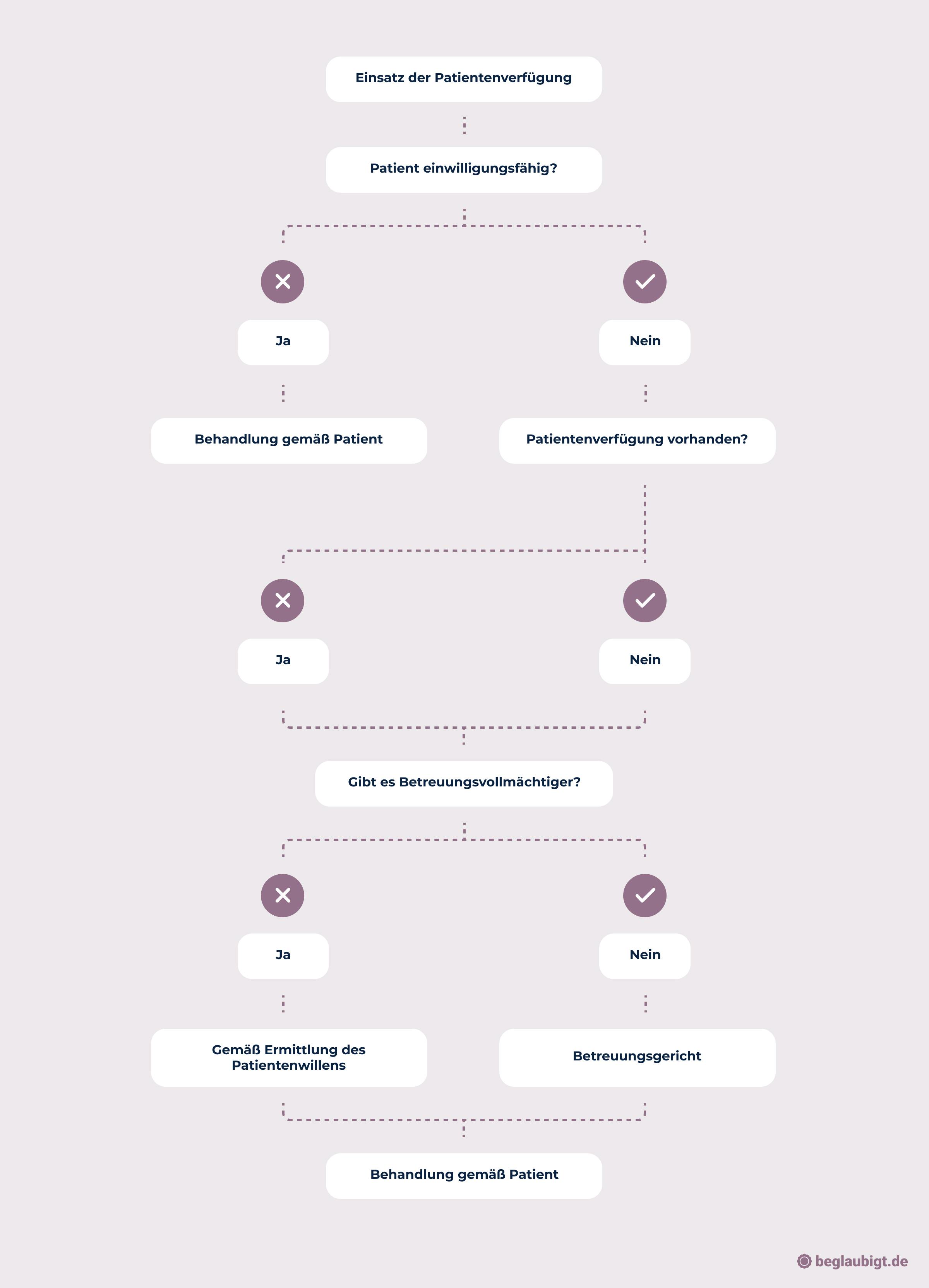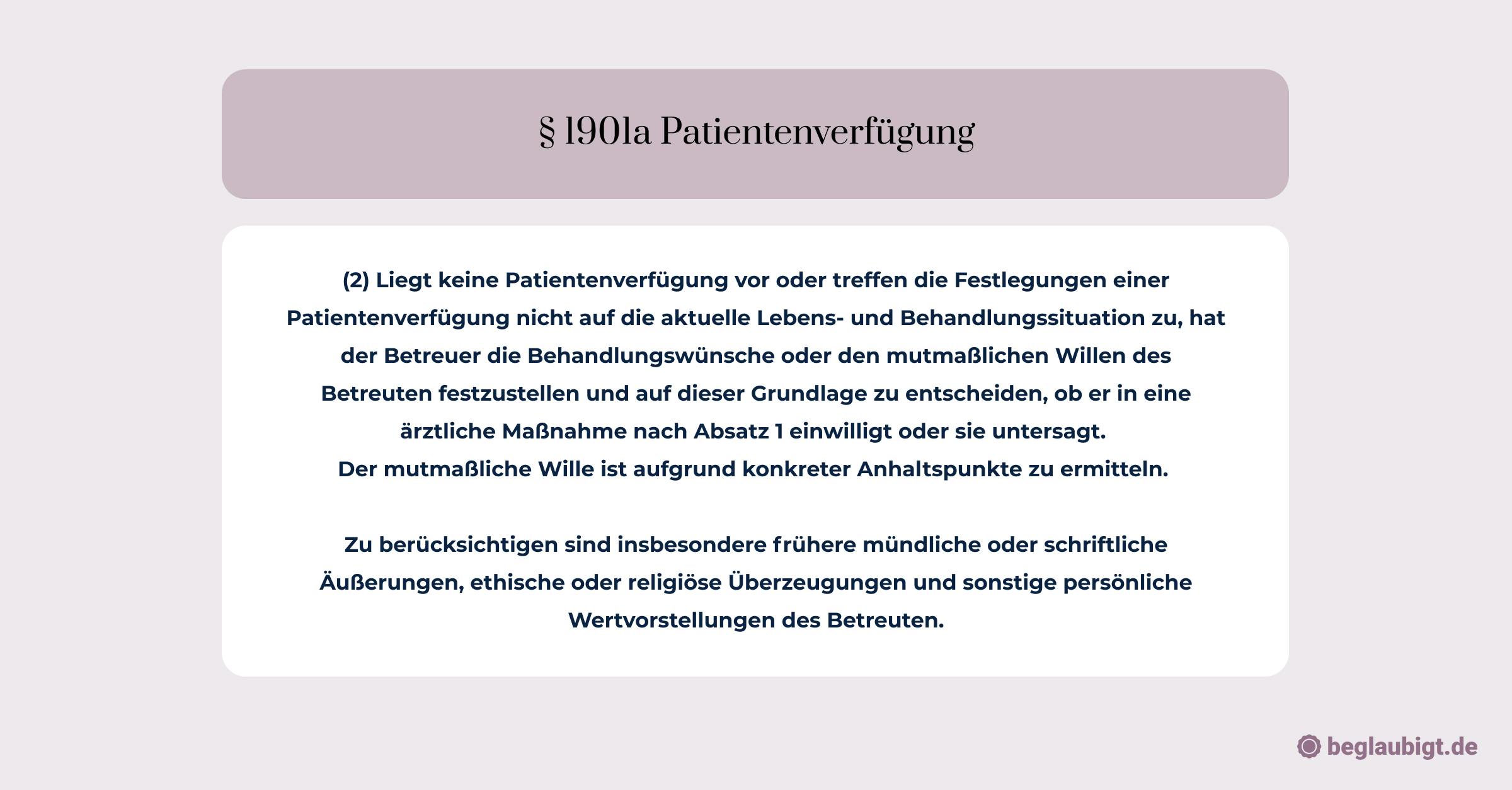A living will is a tool that enables patients to make medical decisions in advance and specify their wishes regarding their medical care in case they are no longer able to make these decisions themselves.
It is an important part of modern medical care and gives patients the opportunity to be self-determined and autonomous, even in situations where they may no longer be able to make their own decisions.
In this article, we will explain the definition, purpose, and legal framework of a living will and provide detailed instructions on how to create a living will and what to consider when implementing one.
What exactly is a living will?
A living will is a written document in which a person specifies in advance which medical measures should be taken or omitted if they are no longer able to make these decisions themselves.
Such a directive serves to ensure that the patient's wishes are taken into account in medical situations in which he or she is no longer able to express or implement his or her decisions.
In Germany, there are legal provisions governing living wills, which are regulated in particular in the Civil Code (BGB) and the Living Will Act (Patientenverfügungsgesetz – PatVG).
The German Civil Code (BGB) stipulates that every person has the right to self-determination and that this right also applies in a medical context. This means that patients themselves can decide which medical measures should or should not be performed on them.

The Living Will Act has been in force since September 2009 and supplements the provisions of the German Civil Code (BGB). Among other things, it regulates the conditions under which a living will is considered binding. According to Section 1901a of the German Civil Code (BGB), a living will is binding if it has been written down, the person concerned was capable of giving consent at the time of writing, the will concerns specific treatment situations, and there are no indications that the patient has changed their mind.
In addition, there is also the option of drawing up a health care proxy. Here, the patient appoints a person they trust to make decisions about medical treatment on their behalf and in accordance with their wishes if they are no longer able to do so themselves.
A health care proxy can also be part of a living will to ensure that the patient's wishes are carried out in medical decisions.
What is the purpose of a living will?
A living will serves to ensure that a person's medical care is provided in accordance with their own wishes and beliefs, even if they are no longer able to make these decisions themselves.
A living will allows a person to specify, for example, which medical measures should be taken or omitted in the event of serious illness or injury. These measures may include artificial nutrition, artificial respiration, or resuscitation measures.
A living will gives patients the opportunity to be self-determined and autonomous, even in situations where they may no longer be able to make their own decisions. Such a will enables patients to assert themselves vis-à-vis doctors and medical staff and to express their wishes even when they are no longer able to do so themselves.

A real-life example would be the case of an elderly patient who is in a coma due to a stroke. In this case, a living will can help ensure that medical measures are carried out in accordance with the patient's wishes and beliefs.
An important aspect of case law is the question of under what circumstances a living will is binding. There are frequent discussions and court proceedings on this issue, which revolve around the question of whether a living will correctly reflects the patient's wishes and whether it is binding under the given circumstances.
A practical example
One example of this is a ruling by the Federal Court of Justice from 2010 (Ref. XII ZB 61/09). In this case, a woman had drawn up a living will in which she stipulated that no life-sustaining measures should be taken if she found herself in an incurable condition. However, when the woman eventually became seriously ill, the doctors disagreed as to whether the living will was binding and whether it actually reflected the patient's wishes.
The Federal Court of Justice ultimately ruled that the living will was binding and that medical measures had to be carried out in accordance with the patient's wishes.

The situation becomes critical when there is no living will and life-changing decisions have to be made, especially when there is no living will. (See No living will – who decides: examples, procedure & case law)
What is the most important thing to consider when making a living will?
The essential aspect of a living will is that it reflects the individual wishes and beliefs of the patient. It is therefore important that a living will is drafted carefully, taking into account the individual's personal circumstances and medical history.
The living will should be as specific as possible and cover all relevant medical procedures that might be an option for the patient. It's also important to review the living will regularly and update it if needed to make sure it reflects the patient's current wishes and beliefs.
Furthermore, it is important that the living will is legally binding and respected by doctors and medical staff. It is advisable to discuss the will with a trusted person and, if necessary, have it reviewed by a lawyer to ensure that it complies with legal requirements.
What are the disadvantages of a living will?
Although a living will generally offers many advantages, there are also some potential disadvantages that should be considered. Here are a few of them:
- Ambiguities: A living will may contain unclear or vague wording that is difficult for doctors and medical staff to interpret. If the will is not clear enough, this can lead to delays in treatment or even legal disputes.
- Limited predictability: Although a living will is based on the patient's current beliefs and wishes, these may change over time. A will that was written years ago may no longer reflect the patient's current wishes.
- Not a panacea: A living will cannot cover all medical situations that may arise during an illness or accident. In some cases, it may be necessary to make a decision that is not included in the will.
- One-sidedness: A living will may offer a one-sided perspective on medical treatment and may not take into account the perspective of medical staff or other persons involved.
- No guarantee: Even if a living will exists, there is no guarantee that it will be implemented in every case. In some cases, for example, it may be difficult to find the will quickly enough in an emergency.
I. Legal framework for living wills

II. Drawing up a living will
When should you draw up a living will?
There is no specific age limit or life situation in which a living will should be drawn up. Anyone can find themselves in a situation where they are no longer able to make medical decisions for themselves due to illness or accident. It is therefore advisable to draw up a living will as early as possible.
In particular, people with a serious or progressive illness or people who are at increased risk of a sudden serious health incident should consider drawing up a living will.
People who are exposed to increased risk in their work, such as soldiers, firefighters, or rescue workers, should also consider drawing up a living will.
It is also important to review your living will and update it if necessary when your life situation changes, such as in the event of divorce or the death of a close relative. Regularly reviewing your living will can ensure that it reflects your current wishes and needs.
How do you draw up a living will?
It is important that the order complies with legal requirements and is formulated clearly and unambiguously.
beglaubigt.de offers a simple and convenient way to create a legally binding living will. Living wills can be created digitally and completely remotely via the beglaubigt.de website. Users are guided step by step through the creation process and can specify their wishes and preferences for medical treatment in the event of serious illness or an accident.
The living wills provided by beglaubigt.de comply with current legal requirements and can be recognized by any doctor or nursing staff in Germany. After completing the creation process, the user receives a certified document that they can check at any time to ensure it is up to date and have it updated if necessary.
How beglaubigt.de simplifies the process of creating a living will
Below are some of the advantages that beglaubigt.de offers when creating a living will:
- Easy to create: Creating a living will at beglaubigt.de is easy and can be done conveniently from home. Users are guided step by step through the creation process and can clearly and comprehensively specify their wishes and preferences.
- Legal certainty: The living wills from beglaubigt.de comply with current legal requirements and are recognized by all doctors and nursing staff in Germany.
- Digital creation: The living will can be created digitally and completely remotely, without the user having to visit a notary or lawyer. (see Living Will PDF)
- Update options: Users can check their living wills at any time to ensure they are up to date and have them updated if necessary.
- Fast certification: Once the creation process is complete, the certified document is quickly delivered by mail.
- Data protection: Beglaubigt.de attaches great importance to data protection and treats user data confidentially.
- Cost transparency: The costs for drawing up a living will are presented in a transparent and clear manner. (Drawing up a living will can usually be expensive – see How much does a living will cost?)
Overall, beglaubigt.de offers a simple and convenient way to create a legally binding living will that complies with current legal requirements.
III. Implementation of a living will
When does a living will take effect?
A living will only takes effect when the person concerned is no longer able to make decisions about medical treatment and measures due to an accident, serious illness, or other cause. Two conditions must therefore be met for a living will to take effect:
- The person concerned must no longer be capable of making decisions for themselves due to unconsciousness, coma, severe dementia, or another cause.
- The wishes and ideas set out in the living will must be applicable to the current situation of the person concerned.
It is important to note that a living will is only valid if it has been drawn up in good time and in the correct form. It is therefore advisable to draw up a living will at an early stage and to update it regularly if necessary to ensure that it reflects your current wishes and ideas.
Who needs to be informed about the living will?
It is important that those persons who have to make decisions about medical treatment in an emergency are informed about the existence and content of the living will. This primarily includes the attending physicians as well as close relatives or authorized representatives who act on behalf of the person concerned.
It is advisable to keep the living will in an easily accessible place and to give a copy to trusted persons and the family doctor. The living will can also be mentioned in the context of a health care proxy or guardianship order to ensure that the person concerned is treated according to their wishes and ideas in an emergency.
It is advisable to check regularly whether the persons concerned are still available and able to make decisions in an emergency.
It can also be helpful to inform the people concerned about your own attitude and ideas regarding medical treatment in general, in order to ensure clear communication and understanding in an emergency.
How long is a living will valid?
The validity period of a living will depends on various factors and may vary depending on the legislation. You can find a detailed article here: How long is a living will valid.
In Germany, for example, a living will is valid indefinitely as long as it is not expressly revoked. However, there is one important restriction: if the will is not specific enough to make a concrete decision, it may not be taken into account.
An unclear or vaguely worded directive may be deemed insufficient by the physician, who may then feel obliged to do everything in his power to preserve the patient's life.
In Austria, a living will is also valid indefinitely if it has been written down and signed by the patient. It can be revoked at any time as long as the patient is still capable of making decisions.
In Switzerland, however, living wills must be renewed every five years in order to remain valid. If a living will is not renewed, it loses its validity after five years and the doctor must take the patient's current wishes into account.
Three important examples of court rulings on living wills that focused on validity:
- Federal Court of Justice (BGH), ruling of July 6, 2016 (Ref. XII ZB 61/16): In this case, a woman had drawn up a living will in which she stipulated that life-prolonging measures should be refused if she were in an incurable condition. However, the directive was not formulated precisely enough to capture the patient's specific wishes. The BGH ruled that a living will must be clear and unambiguous in order to be taken into account.
- Federal Constitutional Court (BVerfG), ruling of June 17, 2010 (Ref. 2 BvR 1426/09): In this case, a man had written a living will in which he refused life-prolonging measures if he were in an incurable condition. Later, however, he verbally expressed his wish that life-prolonging measures should be taken in certain cases. The court ruled that verbal statements cannot override the written will in a living will unless they are specific and current.
- Higher Regional Court (OLG) Hamm, decision of May 9, 2012 (Ref. 20 W 69/12): In this case, a woman had written a living will in which she refused life-prolonging measures. Later, however, she verbally expressed her wish that measures should be taken in certain cases. The court ruled that the verbal statement could override the written will in the living will if it was specific and current and the patient's will was not clearly expressed in the living will.






